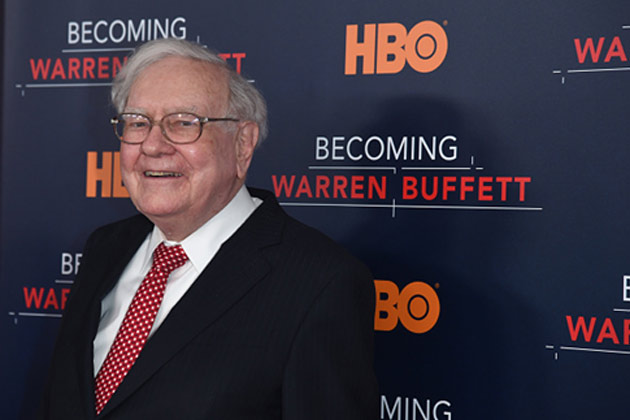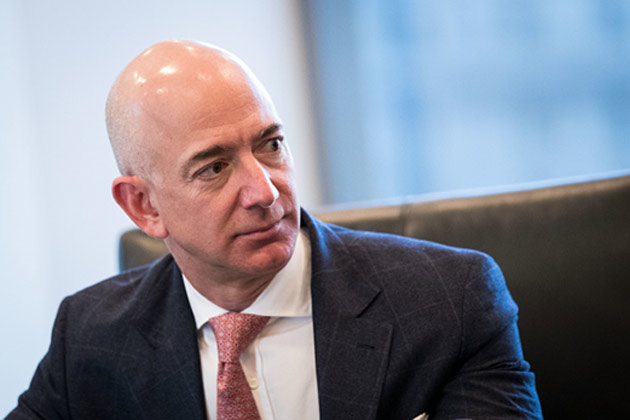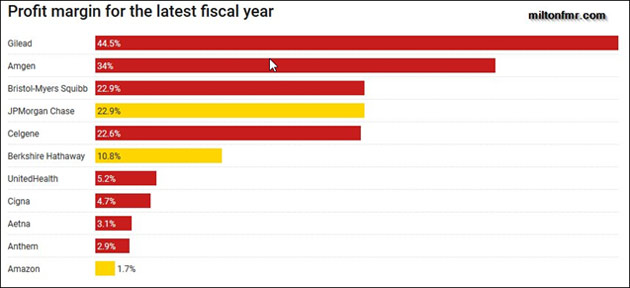| -- | February 6, 2018 The Problem with Healthcare Is Profit By Patrick Watson Never fear, the billionaires are here. They will save us from medical bankruptcy. Every American adult knows healthcare is ridiculously expensive. You pay through the nose for insurance premiums and even more for the deductible if you happen to get sick. Alternatively, your employer pays and recovers the cost through lower salaries. Plus, you probably pay income tax and Medicare tax. Last week, three top CEOs said they will radically transform healthcare for their own employees—and perhaps for the entire United States. Will it work? I’m not holding my breath. However, their idea has a new twist. And considering who came up with it, we’d best pay attention. 
Photo: Getty Images “Hungry Tapeworm” on the American Economy A January 30 CNN report stated: Can Jeff Bezos, Warren Buffett and Jamie Dimon fix health care? Amazon (AMZN) is partnering with Buffett’s Berkshire Hathaway (BRK.A) and JPMorgan Chase (JPM), the nation’s largest bank, to try to address one of the nation’s thorniest and priciest problems—soaring health care costs. The three companies unveiled an as yet unnamed company to give their U.S. workers and families a better option on health insurance. The statement said the new company will be “free from profit-making incentives and constraints.” “The ballooning costs of health care act as a hungry tapeworm on the American economy,” said Buffett. “We share the belief that putting our collective resources behind the country’s best talent can, in time, check the rise in health costs while concurrently enhancing patient satisfaction and outcomes.” Their assessment is correct. We spend far more money on healthcare than other developed countries, and it buys results no better—and in some ways worse—than theirs. 
Photo: World Economic Forum The blue bars in this chart are the percentage of GDP each country spends on healthcare. The gray bars are life expectancy. The US is on the far right. We devote twice as much of our economic output to healthcare than any of the others, yet average US life expectancy is below that of 20 other countries, including Greece, Slovenia, Korea, Italy, and Israel. While there’s disagreement on the causes and solutions, surely we can all agree this is bananas. We misallocate trillions of dollars that could go to much better uses, depressing growth and wasting human capital. As macroeconomic problems go, this is a big one. Bezos, Buffett, and Dimon think they can solve the problem. I wish them luck. Many smart people have tried and failed. 
Photo: Getty Images Different Motives An old saying about advertising says half the money is wasted, but no one knows which half. The same might apply to medical spending. It seems that much of this money makes us no healthier. For instance, last week the Wall Street Journal reported on an effort to reduce chemotherapy treatment for breast cancer patients. “Tens of thousands of women were over-treated, they got surgery they didn’t need, they got radiation they didn’t need, and they got chemotherapy they didn’t need,” says Steven Katz, a professor of medicine at the University of Michigan. If Dr. Katz is right about chemotherapy being overused, it means patients and their employers/insurers spent billions on painful, unnecessary treatment. The only ones benefitting appear to be the chemotherapy drug makers, the doctors who prescribe them, and all the associated providers. That’s not necessarily because they’re all greedy. The problem is, as Upton Sinclair famously wrote, “It is difficult to get a man to understand something, when his salary depends upon his not understanding it!” Bezos, Buffett, and Dimon seem to get this part. Their news release says they will try to reduce costs “through an independent company that is free from profit-making incentives and constraints.” The three billionaire business leaders, who know a lot about profit, think healthcare will work better if they free it from profit motives. Those are fighting words for free-market advocates. In their view, the profit motive is good because it efficiently maximizes everyone’s desires, and I think that’s usually true too. However, Bezos, Buffett, and Dimon appear to think healthcare is an exception. 
Photo: Getty Images Drug Profit Margins Big-name healthcare companies are highly profitable—more so than Amazon, Berkshire Hathaway, or JPMorgan Chase. Here’s a chart comparing their profit margins. 
Graphic: Milton Financial Markets Research Institute The highest profits are generated by Big Pharma. Gilead (GILD) has a margin of almost 45%, and some others aren’t far behind. In comparison, Amazon (AMZN) has a tiny 1.7% margin, which is enough to make Jeff Bezos the world’s richest man. In all fairness, though, Amazon’s is a different business than healthcare. Arguably the drug companies should be rewarded because they take huge risks in developing drugs that may not work, and many fail. But this isn’t capitalism. Those profit margins are huge mainly because taxpayers provide much of the basic research the companies use, and intellectual property laws protect them from competition. Their political muscle prohibits Medicare from negotiating price discounts, even though it is their biggest customer. Those are some of the incentives I think Bezos, Buffett, and Dimon want to eliminate—exactly how is unclear, but they intend to try. They’ve concluded healthcare can’t work like a normal business. But it’s not so simple as just making everything non-profit. Much of the healthcare sector already is. VA hospitals are non-profit and have huge problems. Many “charity” hospital executives earn huge paychecks for maximizing revenue and minimizing costs, even if the bottom line shows a nominal loss. If we don’t let profit be the motivator, something better must take its place, but so far it’s not clear what that would be, or how the US could transition to it. 
Photo: Getty Images Nevertheless, the problem seems to be clear. When revenue and profits become the primary goals, and customers can’t easily go elsewhere, prices spiral upward—and here we are. The US spends more than other countries because our system is built on massive profit incentives. Now, fixing this will be hard because the same money you or I might consider “waste” represents someone else’s paycheck or profit margin. The Three Amigos have their work cut out for them. Many experts are dubious this effort will work any better than past ones. Maybe not, but if they succeed, the US healthcare industry could look radically different a decade from now. So, if you’re a healthcare investor who expects to make long-term profits, you probably should keep your eye on this. See you at the top,  Patrick Watson P.S. If you’re reading this because someone shared it with you, click here to get your own free Connecting the Dots subscription. You can also follow me on Twitter: @PatrickW.  | Subscribe to Connecting the Dots—and Get a Glimpse of the Future
We live in an era of rapid change… and only those who see and understand the shifting market, economic, and political trends can make wise investment decisions. Macroeconomic forecaster Patrick Watson spots the trends and spells what they mean every week in the free e-letter, Connecting the Dots. Subscribe now for his seasoned insight into the surprising forces driving global markets. |
 Senior Economic Analyst Patrick Watson is a master in connecting the dots and finding out where budding trends are leading. Patrick is the editor of Mauldin Economics’ high-yield income letter, Yield Shark, and co-editor of the premium alert service, Macro Growth & Income Alert. You can also follow him on Twitter (@PatrickW) to see his commentary on current events. Senior Economic Analyst Patrick Watson is a master in connecting the dots and finding out where budding trends are leading. Patrick is the editor of Mauldin Economics’ high-yield income letter, Yield Shark, and co-editor of the premium alert service, Macro Growth & Income Alert. You can also follow him on Twitter (@PatrickW) to see his commentary on current events.
Share Your Thoughts on This Article

Use of this content, the Mauldin Economics website, and related sites and applications is provided under the Mauldin Economics Terms & Conditions of Use. Unauthorized Disclosure Prohibited The information provided in this publication is private, privileged, and confidential information, licensed for your sole individual use as a subscriber. Mauldin Economics reserves all rights to the content of this publication and related materials. Forwarding, copying, disseminating, or distributing this report in whole or in part, including substantial quotation of any portion the publication or any release of specific investment recommendations, is strictly prohibited.
Participation in such activity is grounds for immediate termination of all subscriptions of registered subscribers deemed to be involved at Mauldin Economics’ sole discretion, may violate the copyright laws of the United States, and may subject the violator to legal prosecution. Mauldin Economics reserves the right to monitor the use of this publication without disclosure by any electronic means it deems necessary and may change those means without notice at any time. If you have received this publication and are not the intended subscriber, please contact service@mauldineconomics.com. Disclaimers The Mauldin Economics website, Yield Shark, Thoughts from the Frontline, Patrick Cox’s Tech Digest, Outside the Box, Over My Shoulder, World Money Analyst, Street Freak, ETF 20/20, Just One Trade, Transformational Technology Alert, Rational Bear, The 10th Man, Connecting the Dots, This Week in Geopolitics, Stray Reflections, and Conversations are published by Mauldin Economics, LLC. Information contained in such publications is obtained from sources believed to be reliable, but its accuracy cannot be guaranteed. The information contained in such publications is not intended to constitute individual investment advice and is not designed to meet your personal financial situation. The opinions expressed in such publications are those of the publisher and are subject to change without notice. The information in such publications may become outdated and there is no obligation to update any such information. You are advised to discuss with your financial advisers your investment options and whether any investment is suitable for your specific needs prior to making any investments.
John Mauldin, Mauldin Economics, LLC and other entities in which he has an interest, employees, officers, family, and associates may from time to time have positions in the securities or commodities covered in these publications or web site. Corporate policies are in effect that attempt to avoid potential conflicts of interest and resolve conflicts of interest that do arise in a timely fashion.
Mauldin Economics, LLC reserves the right to cancel any subscription at any time, and if it does so it will promptly refund to the subscriber the amount of the subscription payment previously received relating to the remaining subscription period. Cancellation of a subscription may result from any unauthorized use or reproduction or rebroadcast of any Mauldin Economics publication or website, any infringement or misappropriation of Mauldin Economics, LLC’s proprietary rights, or any other reason determined in the sole discretion of Mauldin Economics, LLC. Affiliate Notice Mauldin Economics has affiliate agreements in place that may include fee sharing. If you have a website or newsletter and would like to be considered for inclusion in the Mauldin Economics affiliate program, please go to http://affiliates.ggcpublishing.com/. Likewise, from time to time Mauldin Economics may engage in affiliate programs offered by other companies, though corporate policy firmly dictates that such agreements will have no influence on any product or service recommendations, nor alter the pricing that would otherwise be available in absence of such an agreement. As always, it is important that you do your own due diligence before transacting any business with any firm, for any product or service. © Copyright 2018 Mauldin Economics | -- |
